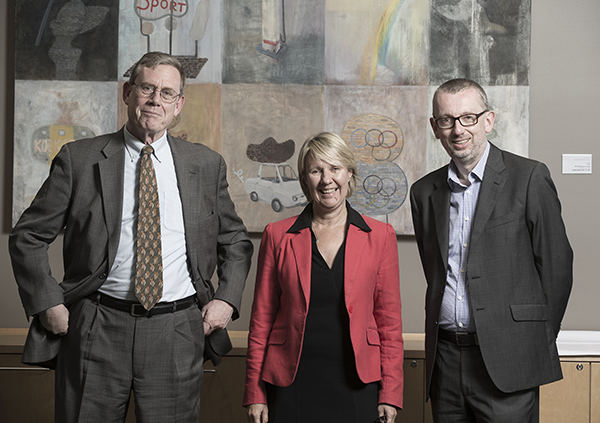March 2, 2015
International perspectives on 21st Century learning and teaching practices
The role of languages, blended learning and big data were on the agenda during a discussion led by three leading higher education experts at UOW on 18 February.

Hosted by the Wollongong Academy of Tertiary Teaching and Learning Excellence (WATTLE), UOW Deputy Vice-Chancellor (Academic) Professor Eeva Leinonen was joined by Professor Peter Bol, Vice-Provost for Learning Advances, Harvard University, Boston, and Professor Anthony Smith, Vice-Provost, Education & Student Affairs, University College London (UCL), to discuss teaching and learning strategies for the 21st century.
UOW was delighted to have Professors Bol and Smith visit the Wollongong Campus. The visit provided a unique opportunity for our local higher education community to engage in face-to-face dialogue with colleagues from two world-leading universities and discuss current and future practices on a global scale.
Massive Online Open Courses (MOOCs) and the student experience were subjects of interest and open discussion with the 40-plus UOW colleagues who attended the session.
Professor Bol, who is responsible for the HarvardX online learning platform, acknowledged that creating content for people from all over the globe is a challenge. HarvardX has nearly two million people registered for courses, 70 per cent of which are outside of the US.
“MOOCs have involved us internationally in a way that we did not expect,” he said.
“How do people learn in different cultures? It's something we don't understand well but want to,” he added.
The concept of quality online education has prompted academics who have otherwise been focused on research to become more involved in developing content for online courses.
“Teaching 200 thousand plus people appeals to many,” Professor Bol said.
Prof Peter Bol says HarvardX #MOOCs have got us to thinking about how we learn in other cultures. Made us think more internationally
— OpenUOW (@OpenUOW) February 18, 2015
The discussion acknowledged that online learning platforms are also transforming how degrees are delivered to students on-campus as well, with universities around the world are adopting ‘blended learning’ models at varying levels, providing a combination of face-to-face and online experiences for all students.
“But what is the right amount of contact for teachers to have with students and how do you achieve that? If you deliver some of the course online then you need to spend that time saved with face-to-face interaction. We need to add value to the on-campus experience,” Professor Bol said.
Setting out the big ideas behind UCL's 20 year strategy during Wollongong visit #UCL2034 @UOW @uclnews pic.twitter.com/woI8thG5d3
— Anthony Smith (@AnthonySmithVP) February 18, 2015
The role of the university in creating responsible global citizens was also a feature of the discussion.
According to Professor Smith, who is responsible for the education agenda at University College London, language is a critical component of global citizenship and is an integral part of undergraduate degrees at UCL.
“If you want to come to UCL you have to have a commitment to study a language. It’s part of the deal,” he said, referring to UCL’s Modern Foreign Language requirement.
Prof Anthony Smith from University College London - talks about using "tasters" to encourage undergrads to not be afraid of postgrad study.
— OpenUOW (@OpenUOW) February 18, 2015
Alongside foreign language skills, other non-professional specific skills and traits, such as the ability to be flexible or being worldly will help individuals stand out among a crowd of job seekers.
“It’s the people that are excited about the opportunities and learning they have ahead of them that will attract the attention of employers,” Professor Leinonen said.